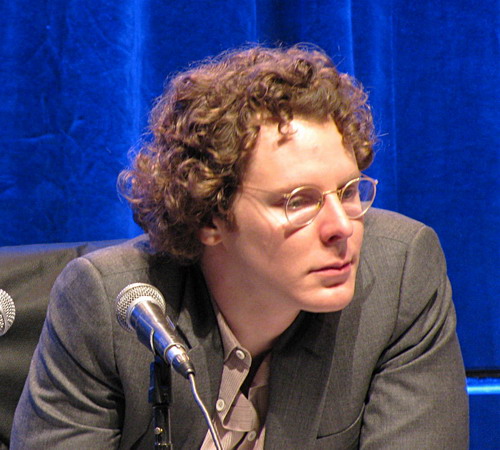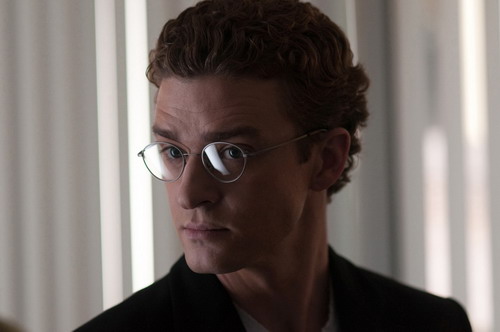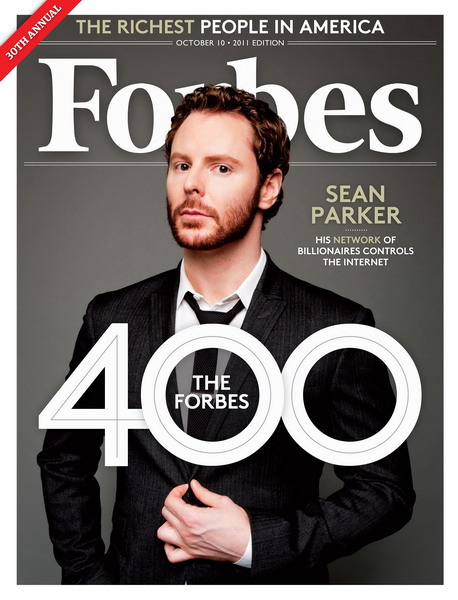Personality: Sean Parker is the “eternal outsider” who knows everything
26.06.12
At 19, Sean Parker helped create Napster. At 24, he became the co-founder of Facebook. At 30, he’s a party animal, a genius, a social media savvy, a press-shy, budding billionaire. And now he’s a celebrity after Justin Timberlake played him in David Fincher’s The Social Network. Parker is considered by many to be the web oracle. Repeatedly his colleagues and acquaintances used the word “genius” in relation to him. He understands not only computers and networks, but also how people would like to implement them into their lives. And as a result, he became incredibly successful. But there is, of course, a downside.
Brief information
Full name:Sean Parker
Date of birth:December 3, 1979
State: $2.1 billion
Hipster, catalyst of brilliant ideas, party animal. Co-founder of Napster and former president of Facebook. Currently he is a partner of the venture capital fund Founders Fund. His partners include Peter Thiel, the founder of PayPal and an early investor in Facebook, and Brian Singerman, the creator of iGoogle. The Founders Fund portfolio includes several dozen projects, from the streaming music service Spotify to space transport developer SpaceX.
Scandalous childhood
Sean Parker was born in Herndon, Virginia, to Diana Parker, a TV advertising broker, and Bruce Parker, an oceanographer. Despite his science background, Sean’s father knew how to program, which he also taught his son at the age of seven, using an 8-bit Atari 800 computer. As a teenager, the boy’s main hobby was hacking, which provoked trouble. At the age of 16, Sean first got involved in a scandalous story. When he was sitting at school during a lesson on world civilizations, he was given a note. His father, it said, was waiting for him to go to an appointment with an orthodontist. A chill ran down Parker’s spine. He was not registered with this doctor. When Sean left school, his father angrily shoved him into the family minivan. By the time they arrived at their modest country home, a group of FBI agents were removing documents and a desktop computer from Sean’s room. Parker was charged with hacking, as a result of which he was sentenced to community service.
They say about Parker that he grew up as a unique personality. A self-taught person who barely finished school, he is nevertheless very smart. As a sickly child whose asthma attacks periodically sent him to the hospital, he began to read widely from an early age. There is practically no topic – in literature, politics, medicine or technology – on which he could not carry on a conversation and express his opinion. He graduated from Oakton High School in 1998. Sean did not receive a college education. It didn’t take him long to convince his parents not to go to college, as he earned more than $80,000 during his senior year. Such high earnings helped him move to San Francisco.

Sean Parker in his youth
Pseudonym as a trademark
In 1999, together with his childhood friend Sean Fanning and his colleague Jordan Ritter, Parker founded the music project Napster – the first widely used p2p (peer-to-peer) file sharing service. By the way, the name was Fenning’s pseudonym.
Napster was a peer-to-peer network, although it used centralized control to obtain a list of connected computers and a list of files provided. The file exchange itself took place without the participation of a central server. Despite the existence of networks that facilitated file sharing, Napster specialized exclusively in MP3 music and provided a user-friendly interface. The result was a system whose popularity generated a huge selection of music for download.
Although the music industry denounced peer-to-peer music sharing as theft, many Napster users felt that such downloads were justified for many reasons. One of the arguments is the quality of new albums, which declined greatly by the mid-1990s, when a typical album contained only one or two good songs and “musical filler”—dummy songs. Therefore, users were grateful to Napster for the opportunity to download several songs without having to pay for the entire album. Napster also provided an excellent opportunity for music lovers to exchange songs that are difficult to find – old recordings and songs from concerts, bootlegs (audio recordings compiled and distributed without the permission of copyright holders), etc. Users also had the opportunity to download music that they purchased before the popularization of compact -discs (for example, on vinyl records, cassettes), in digitized form.

The Napster logo is still used today in the paid version of the service
The reason for the closure of Napster was the appearance of a demo version of the song “I Disappear” groups Metallicaa few days before its official release. This did not please the band members, especially drummer Lars Ulrich, on whose initiative a lawsuit was filed against the company. Further lawsuits led to the closure of the service. Today, the trademark and logo are used by the paid music service Napster (www.napster.com).
Attempt number two
Parker’s next project in late 2002 was Plaxo. The team also included Minh Nguyen and two Stanford engineering students, Todd Masonis and Cameron Ring. (http://techcrunch.com/). Plaxo was an online address book integrated with Microsoft Outlook. Quite quickly, it became the most famous service on the Internet for its annoyingness, bombarding innocent Internet users with requests to update information in their friends’ address books. For Parker, it was a victory—a triumph of viral marketing.

The Plaxo service also survived the collaboration of its co-founders with Parker and is now quite popular and under development
But defeat soon followed. Parker’s unreliability began to take its toll on his colleagues and the company’s investors. Sometimes he might not come to work at all. And at the beginning of 2004 he was fired. The company’s board of directors subsequently hired a private investigator to find out whether there was any truth to the rumors that Parker, in particular, was supplying drugs to colleagues. Parker, who calls the allegations a “ridiculous, sleazy campaign,” found himself back on the streets and broke again.
Better than Starbucks
After resigning from Plaxo, Sean couldn’t find a new job for a long time, and he was already thinking about getting a job at Starbucks, but then he saw Facebook, which had just appeared at that time. Parker almost immediately arranged a meeting with Mark Zuckerberg (seehi–Tech PRO &&/2011). During one of the first meetings, he convinced Mark to leave Harvard and go to Palo Alto, which Zuckerberg did. But Sean’s credit for Facebook’s success goes beyond Zuckerberg’s move from one side of America to the other. It was Sean who attracted the first investments in the project, which were made by Peter Thiel. In 2004, Parker, after meeting Mark Zuckenberg, became president of the social network Facebook, receiving 7% of profits in his personal bank account. But already in 2005, he had to leave the post of president of the social network after being arrested for possession of cocaine.
The film “The Social Network” describes precisely this stage of Parker’s life. The film chronicles the first year of Facebook, partly depicting the “dark side” of Parker’s personality. Justin Timberlake plays the smarmy and treacherous Parker, who, both in the film and in real life, was Zuckenberg’s main mentor during the formation of Facebook. But according to Aaron Sorkin’s script, Parker also turns out to be intense, greedy and manipulative. “A million dollars is not cool,” Parker says at one point in the film. – You know what’s cool? Billion”.

Justin Timberlake as Sean Parker in the movie “The Social Network”
Working with a social billionaire
Parker’s friends claim that the real Sean is more complex and interesting. In particular, Parker is a sophisticated dandy, as well as a rather unique and unusual personality in the annals of businessXXIcenturies. At age 30, he’s nearly worth a billion dollars, largely thanks to the Facebook shares he still owns.
He has focused and directed his knowledge and instincts into the field of Internet business strategy to, as he says, reshape society. “Technology, rather than business or government, is now the real driving force behind large-scale changes in society,” says Sean. Parker is also known for being good at predicting where the next wave of technology will go (and what type of product or service consumers will want), so companies often bring him in just to use his brain. “Not many people are as smart as him,” says Zuckerberg, who still consults his former partner regularly.
But despite all his web experience, at times it seems like Parker is only interested in entertainment. He is a “programmer-as-rock-star” who often spends time among real rock stars and leads a lifestyle that matches this. He usually gets up very, very late, actively discusses things that interest him or attends parties – and then sleeps most of the next day. In the words of his longtime friend, San Francisco IT investor Ron Conway: “The fact that Sean is so absent-minded and yet so talented is a combination you don’t see often. He will probably create five more “game-changing” companies before he gets tired of it.”

Despite the fact that he does not have a close business relationship with Mark Zuckerberg, Sean Parker gives Mark friendly advice on strategic planning
Working with Parker, according to several of his colleagues, can not only be a pleasure, but also lead to frustration. Joe Greene, Zuckerberg’s Harvard classmate who now partners with Parker on a Facebook app called Causes that helps people donate to nonprofits, first met Parker six years ago at that same summer home in Palo Alto. “I was sleeping on the couch,” Greene recalls, “and Sean came in to borrow money for a haircut.”
One day, Green said, when the two were late for a plane, Parker simply refused to look up from his email. “He said he was busy with something very important that was worth it.” At times, Greene says, the only way to reach Parker is through “call bombing”—calling 10 or 20 times before Parker, who rarely listens to his answering machine, realizes that someone really wants to talk to him.
Reid Hoffman, a longtime friend and founder of LinkedIn who sits with Parker on the board of directors of Gowalla, a geo-based social media service, recalls Parker pitching an intriguing new concept for the company during their conversation in Davos, Switzerland. “I said, ‘Dude! You should start coming to the board of directors more often!” That’s Parker’s style – great idea, workaholism, and then disappears.” “Why do we put up with all this? – Green asks rhetorically. – For two reasons. He adds significant value while he’s there. And he is very loyal. When you really need him, he will be with you. This provides a margin of trust.”
…and friendship

Parker is an avid partygoer, including in the world of show business. In the photo – Sean Parker, Mark Zuckerberg and singer Snoop Dogg
Parker finds it easy to make new friends and does so quite often. People of all types find themselves captivated by his ideas and enthusiasm. “Sean is a genius, no question,” says Ashton Kutcher, whom Parker advised when the actor started his Internet-focused production company. Wikipedia founder Jimmy Wales met Parker in 2008, and they began spending time together. “He’s a quick thinker,” Wales said. “He’s incredibly passionate and full of ideas.” One of Parker’s close friends, musician Sean Lennon, suggests: “His brain is like the technological equivalent of the Library of Alexandria. He is truly one of the smartest people I have ever met – and that is an understatement. He always talks about the potential of computers to generate algorithms for tunes that people will like. He believes it’s only a matter of time before computers learn how to create music. Sean is a man of art, an “artist” from business.”
Actress and activist Trudie Styler, Sting’s wife, invited Parker and his then-girlfriend to an evening of philanthropists and community leaders the couple hosted at their Tuscan estate last year. There, Parker met Lara Ziskin, a producer of Spider-Man films and co-founder of a cancer charity. “It turns out that Sean has an interest in immunology and a belief that this is the next frontier of research in the fight against cancer,” Ziskin says. “He talked to as many people about it as I did!” Now they are friends. Styler says she was impressed: “He was so polite and kind to everyone. A being of a higher order. I’m very proud of him.”
A lover of the good life, Parker remains a collector of smart white boots, his wardrobe is full of Tom Ford suits, and he never seems to have enough time to drive a $100,000 Tesla electric sports car. He spends his evenings either in an apartment in San Francisco or in a five-story town house he rents in New York. Among its many “amenities” is a well-kept lawn on the third floor balcony.

Sean Parker is known as a famous dandy who loves stylish clothes and a beautiful life
And although he hardly thinks about hiring a private jet for an overnight flight from New York to Washington, he is still quite generous. When his friends organize fundraisers for charity, Parker is often one of those who donates the largest amount. Being a tea connoisseur (he has more than a hundred types in his collection), he independently packages his favorite varieties and presents them in teapots ordered from Japan. He invested in the businesses of a variety of people, often under the influence of emotions. “He’s one of the most generous people I know,” says an acquaintance, “and also one of the most unpredictable.”
Plans for today and tomorrow
Parker currently spends most of his time sourcing and managing investments for Founders Fund, Peter Thiel’s venture capital firm. His current allegiance: a London-based music company called Spotify, which he believes can finish what he and Fenning started at Napster, only this time – legally. However, not everything Parker touches necessarily turns to gold. Some time ago, he invested in a not very successful project to produce hand-painted clothing.
He also took part briefly in a brainstorming session with a group that included his old comrade Sean Fenning and Chatroulette’s 18-year-old founder, Andrei Ternovsky, about how to turn the online video website into a full-fledged service. And when he’s in New York, he takes piano lessons from Sean Lennon.

Parker has a rather peculiar work style, and his colleagues complain about him. But this does not prevent him from being considered an excellent boss and earning millions
Although Parker has some significant accomplishments for his age, he surprisingly lacks confidence. “If there is any triumphant ending to this story, I think it is in the circuitous way in which I got to what I wanted,” Parker states, “I wanted to be able to do interesting things and be rich enough to stay free… And to some extent I can do what I want. Perhaps I have to work harder to earn a good opinion of myself in the eyes of new acquaintances who have heard many strange stories about me. But at least I can arrange a meeting with them.”
Parker even met his on-screen alter ego Justin Timberlake at a club after the actor read Aaron Sorkin’s script. “He said he wanted to get to know me,” Parker recalls, “but I said, ‘It won’t help you to play what Sorkin wrote. This person in the script has little in common with me.”
Indeed, Sorkin’s Parker turned out to be vengeful, calculating and evil, not at all like the real one. According to the script, Parker is also greedy, which is also not a quality of the real Sean. More than money, he needs approval and recognition. “I helped change the world at least three times,” Parker said at one point, in self-justification. And he added regretfully: “I am an eternal outsider.”
Useful links
- www.facebook.com/Sean – Sean Parker on Facebook
- https://twitter.com/#!/sparker – Sean Parker on Twitter
- www.foundersfund.com/team/sean-parker – page on the website of the Founders Fund company
- www.yammer.com/about/management – page on the Yammer website
Editor
Don't miss interesting news
Subscribe to our channels and read announcements of high-tech news, tes
Oppo A6 Pro smartphone review: ambitious

Creating new mid-range smartphones is no easy task. Manufacturers have to balance performance, camera capabilities, displays, and the overall cost impact of each component. How the new Oppo A6 Pro balances these factors is discussed in our review.
Oppo Reno 15 5G smartphone review: confident

The Oppo Reno15 smartphone emphasizes design, a high-quality display, versatile cameras, and good battery life. Let’s take a closer look.
Starlink Mobile 5G will provide connection speeds of 150 Mbps even in the Arctic internet SpaceX
SpaceX is preparing to launch its global 5G-enabled Starlink Mobile service. The US Federal Communications Commission (FCC) has approved the launch of up to 15,000 direct-to-cell (D2C) satellites.
Study: Artificial Intelligence uses nuclear weapons in 95% of simulations artificial intelligence war
Researchers at King’s College London conducted a series of military simulations using leading artificial intelligence models. The tests used OpenAI’s GPT-5.2, Anthropic’s Claude Sonnet 4, and Google’s Gemini 3 Flash.






